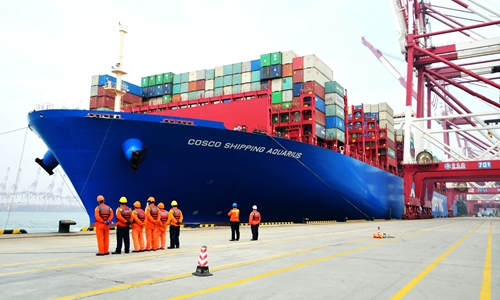One-time relocation fee can hardly lure US firms back home: analyst
By GT staff reporters Source:Global Times Published: 2020/4/12 20:03:40

A COSCO ship at Qingdao Port in East China's Shandong Province Photo: IC
White House National Economic Council Director Larry Kudlow's hope of bringing back US companies from China by simply paying relocation fees is a desperate and fatuous proposal to shore up the US economy amid a worsening COVID-19 situation, because what keeps them from returning are higher US labor costs and hollowed-out ancillary industries, experts said.
Industry players also noted that profit-driven US companies won't easily give up the world's largest market for a one-time payment. Those attracted by the offer may already be on the verge of bankruptcy in China and won't contribute much to job creation in the US, so it will just be a waste of American taxpayers' money.
Kudlow said that the US "should pay the moving costs" of every US company that wants to move out of China.
"I would say, 100 percent immediate expensing across the board for plant, equipment, intellectual property, structures, renovations... In other words, if we had 100 percent immediate expensing, we would literally pay the moving costs of American companies," Kudlow said in an interview with FOX Business Network on Thursday.
Moving manufacturing back to the US is not a matter of immediate expense. Companies will face rising labor costs, plus the reshaping of the upstream and downstream ends of the industry chain, and all of these issues will greatly raise operating costs to a level that they may not bear, Bai Ming, deputy director of the Ministry of Commerce's International Market Research Institute, told the Global Times on Sunday.
For instance, an analysis from Bank of America Merrill Lynch has estimated that for the "most likely" scenario in which Apple moves 10 percent of its iPhone assembly back to the US, the average selling price of the iPhone would rise 9 percent. If it shifts 50 percent to the US, iPhone prices would increase 14 percent, and by 20 percent if shifts 100 percent back home.
"The only reason that could drive US firms back is that operating in the US would be more profitable than in China, which is obviously not the case, and US companies won't go bankrupt in order to get a relocation fee," Hu Qimu, senior fellow at Sinosteel Economic Research Institute, told the Global Times.
Kudlow is clearly desperate to bring down the US' unemployment rate and has offered a perverse approach to the market, Hu said.
"I don't think the relocation could happen, as always, although some in the US have sought to make that happen for a long time," said an employee at the Beijing office of a major US tech company.
"US companies will also not give up the lucrative China market in any way, and they will also not give up the years of effort in the world's second-largest economy whose potential is yet to be fully unleashed," the person, who asked to remain anonymous, told the Global Times on Sunday.
The person noted that relocation of some labor-intensive industries to countries such as Vietnam has already happened in the past few years, but that's in accordance with the international division of labor and in line with the industrial upgrading efforts in China.
Experts noted that the proposal also comes amid the worsening global pandemic, which has provoked a global trend of protecting domestic supply chains, especially for some key industries.
Previously, Japan announced that it would spend upwards of $2.2 billion to get some of its companies out of China and either back home or spread throughout Southeast Asia.
It is also possible that the US may issue more aggressive policies to force some industries that are conducive to the so-called national security to return to the US, or set up back-up lines in industries such as active pharmaceutical ingredients and ventilator companies, but no large-scale departures from China will happen, industry insiders said.
RELATED ARTICLES:
- Fishers wear masks during COVID-19 outbreak in Bali, Indonesia
- Chinese netizens boycott Thai boys' love drama '2gether: The Series' due to inappropriate comment about COVID-19 by leading actor's girlfriend
- Hubei to promote hospital head and three other officials who excelled in fighting COVID-19 pandemic
Posted in: ECONOMY